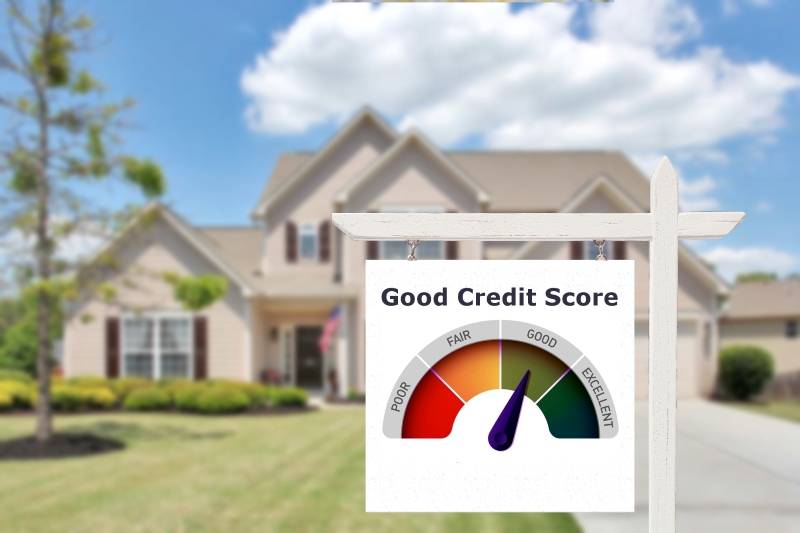A good credit score to buy a house is generally 620 or higher. A good credit score is crucial when obtaining a mortgage loan.
To secure a mortgage loan, having a good credit score is essential. Generally, a credit score of 620 or higher is considered good when you want to buy a house. Lenders use credit scores to evaluate the risk of lending money and determine the interest rate borrowers will receive.
A higher credit score increases the likelihood of loan approval and better loan terms. It is important to maintain a good credit score by paying bills on time, keeping credit card balances low, and managing debt responsibly. By doing so, you increase your chances of qualifying for a favorable mortgage loan and achieving the dream of homeownership.

Credit: www.bankrate.com
Understanding Credit Scores For Homebuyers
Credit Scores And Their Significance In Homebuying
Having a good credit score is a crucial part of the homebuying process. Lenders use credit scores to assess the risk of lending money to potential homebuyers. A higher credit score can increase your chances of getting approved for a mortgage loan and can also help you secure a lower interest rate.
But what exactly is a good credit score when it comes to buying a house? Let’s dive into the details and understand credit scores for homebuyers.
Understanding Credit Scores
- A credit score is a three-digit number that ranges from 300 to 850. The higher the score, the better your creditworthiness. Lenders use different credit scoring models, with fico being the most common one.
- Credit scores are calculated based on various factors, including payment history, amounts owed, length of credit history, new credit, and credit mix.
- A good credit score for buying a house typically falls within the range of 620 to 850, with 700 and above considered excellent. However, different lenders may have their own criteria and scoring thresholds.
- Lenders consider credit scores to assess the risk of lending. A higher credit score indicates a lower risk, making you a more desirable borrower.
- A good credit score not only improves your chances of loan approval but also enables you to qualify for better loan terms, such as a lower down payment requirement and lower interest rates.
- On the other hand, a lower credit score may limit your mortgage options and result in higher interest rates, which can significantly impact your monthly mortgage payments.
Benefits Of A Good Credit Score
A good credit score not only opens doors to favorable financing options, but it also provides several other benefits for homebuyers:
- Increased loan approval chances: Lenders are more likely to approve your mortgage application if you have a good credit score. This can speed up the homebuying process and provide you with greater peace of mind.
- Lower interest rates: With a good credit score, you can qualify for lower interest rates, which can save you thousands of dollars over the life of your mortgage.
- Favorable loan terms: Lenders may offer you more favorable loan terms, such as a lower down payment requirement, if you have a good credit score. This can make homeownership more accessible and affordable.
- Enhanced bargaining power: A strong credit score gives you leverage when negotiating with lenders. You can use it as a bargaining chip to secure better loan terms or to negotiate closing costs.
- Access to higher credit limits: A good credit score may also increase your chances of being approved for higher credit limits, providing you with more financial flexibility for home-related expenses.
Maintaining a good credit score is crucial for homebuyers as it can significantly impact your ability to secure favorable mortgage financing. By understanding credit scores and prioritizing responsible credit management, you can pave the way toward achieving your dream of homeownership.
Why Is A Good Credit Score Important?
The Role Of Credit Scores In Mortgage Approval
When it comes to buying a house, your credit score plays a crucial role in the mortgage approval process. Lenders use credit scores to assess your creditworthiness and determine whether you’re a low-risk borrower. A good credit score can open doors to better loan terms and lower interest rates, while a poor credit score can make it difficult to secure a mortgage altogether.
Understanding the importance of a good credit score is essential for anyone considering homeownership.
How A Good Credit Score Helps Secure Better Loan Terms
A good credit score not only increases your chances of getting approved for a mortgage but also helps you secure better loan terms. Here are a few key points to keep in mind:
- Lower interest rates: Lenders consider borrowers with higher credit scores as less risky. As a result, they are more willing to offer lower interest rates to applicants with good credit scores. With a lower interest rate, you’ll end up paying less over the life of the loan, saving you a significant amount of money.
- Higher loan limits: Having a good credit score can also qualify you for higher loan limits. Lenders are more likely to lend larger amounts to individuals with a proven track record of responsible credit management. This can be particularly beneficial if you’re looking to purchase a more expensive property or need a larger loan.
- Improved negotiating power: A good credit score gives you negotiating power when dealing with lenders. With multiple lenders competing for your business, you can leverage your good credit score to negotiate better terms and conditions, potentially saving you even more money.
- Faster application process: A good credit score can expedite the mortgage application process. Since lenders perceive you as a low-risk borrower, they may waive certain requirements or streamline the verification process, resulting in a quicker loan approval.
- Access to special programs: Some lenders offer special loan programs and incentives to borrowers with high credit scores. These programs may include lower down payment requirements, reduced closing costs, or even government-backed loan options. By maintaining a good credit score, you’ll be eligible for these advantageous programs.
A good credit score significantly impacts your ability to buy a house and determines the loan terms you’ll be offered. From lower interest rates to larger loan limits, a strong credit score opens up opportunities and can save you thousands of dollars over time.
Prioritizing your credit score and taking steps to improve it before applying for a mortgage is essential for a smooth home-buying journey.
Factors That Determine Credit Scores For Homebuyers
A good credit score is essential when it comes to buying a house. Lenders use credit scores to evaluate a borrower’s creditworthiness and determine the terms of the mortgage. But what factors contribute to these credit scores? Let’s take a closer look at the key elements that can impact your credit score as a homebuyer.
Payment History And Its Impact On Credit Scores
Your payment history carries significant weight in determining your credit score. Lenders want to see a track record of responsible financial behavior. Late payments or missed payments can negatively affect your credit score, making it harder to secure a mortgage.
Here are some important points to consider:
- Making payments on time consistently is crucial for a good credit score.
- Missed or late payments can stay on your credit report for up to seven years.
- Collection accounts and public records, such as bankruptcies or tax liens, can significantly impact your credit score.
Utilization Ratio And Its Effect On Credit Scores
The utilization ratio refers to the percentage of your available credit that you’re currently using. This ratio plays a vital role in determining your credit score. Here’s what you need to know:
- Aim to keep your credit card balances low and avoid maxing out your credit lines.
- High utilization ratios can negatively impact your credit score.
- Lenders prefer to see a utilization ratio of less than 30%.
Length Of Credit History And Its Influence On Credit Scores
The length of your credit history is another factor lenders consider when evaluating your creditworthiness. A longer credit history provides more data for lenders to assess your financial behavior. Keep the following points in mind:
- Opening new credit accounts may temporarily lower your credit score due to a shorter average credit history.
- It’s beneficial to establish a long credit history by keeping older accounts active.
- Lenders typically prefer borrowers with a longer credit history, demonstrating a consistent repayment track record.
Types Of Credit And Their Role In Determining Credit Scores
The types of credit you have also contribute to your credit score. Demonstrating responsible management of various credit types can positively impact your creditworthiness. Consider these points:
- Having a mix of different types of credit (e.g., credit cards, mortgages, car loans) can be beneficial.
- Lenders prefer borrowers who have successfully handled different credit obligations.
- However, it’s important to only obtain credit that you can manage responsibly.
Credit Inquiries And Their Impact On Credit Scores
Every time you apply for credit, it triggers a credit inquiry, which can affect your credit score. Multiple inquiries within a short period may raise red flags for lenders. Here’s what you need to remember:
- Soft inquiries (e.g., when you check your own credit score) do not impact your credit score.
- Hard inquiries, such as when you apply for a mortgage, can temporarily lower your credit score.
- Be mindful of applying for multiple credit accounts simultaneously, as it may negatively impact your credit score.
Understanding the factors that determine credit scores for homebuyers is crucial in your journey to homeownership. By maintaining a strong payment history, managing your credit utilization, fostering a long credit history, diversifying your credit types, and being cautious with credit inquiries, you can work towards building a good credit score that will help you secure your dream home.
What Is Considered A Good Credit Score For Homebuying?
When it comes to buying a house, your credit score plays a crucial role in determining your eligibility for a mortgage loan. Lenders use your credit score to assess the risk of lending you money and to determine the interest rate you’ll qualify for.
The higher your credit score, the more favorable terms you can expect. But what exactly is considered a good credit score for homebuying? Let’s delve into the fico credit score ranges and their significance, as well as the recommended credit scores for mortgage approval.
Fico Credit Score Ranges And Their Significance
- Excellent credit (800-850): If your credit score falls within this range, you can expect the best terms and interest rates available. Lenders view borrowers with excellent credit as low-risk individuals who consistently manage their debts responsibly.
- Very good credit (740-799): Falling within this range indicates that you have a strong credit history and are likely to receive favorable mortgage terms. While not as exceptional as an excellent credit score, a very good credit score still positions you as a low-risk borrower.
- Good credit (670-739): A credit score within this range is considered good and should still enable you to secure a mortgage loan. However, you may not qualify for the most competitive interest rates, and lenders may require additional documentation or a larger down payment.
- Fair credit (580-669): With a fair credit score, you may be able to obtain a mortgage, but you’ll likely face more stringent lending requirements. Lenders may charge higher interest rates and require a larger down payment to compensate for the increased risk associated with borrowers in this credit range.
- Poor credit (300-579): Having a credit score in this range can make it challenging to secure a mortgage loan. Lenders may be hesitant to approve your application, or they may offer you less favorable terms and higher interest rates.
Recommended Credit Scores For Mortgage Approval
- Conventional loans: To qualify for a conventional mortgage loan, lenders generally prefer a credit score of 620 or above. However, a higher credit score, typically around 740 or higher, may help you secure a lower interest rate.
- Fha loans: The federal housing administration (fha) provides loans to borrowers with lower credit scores. While the minimum credit score requirement for an fha loan is typically 580, some lenders may accept scores as low as 500 with a larger down payment.
- Va loans: For eligible military service members, the department of veterans affairs (va) offers loans without a strict credit score requirement. However, most lenders prefer a credit score of at least 620 to qualify for a va loan.
- Usda loans: The united states department of agriculture (usda) offers loans for rural and suburban homebuyers with low to moderate income. While there is no specified minimum credit score requirement, lenders often expect a score of 640 or higher to approve a usda loan.
Remember, these recommended credit scores are general guidelines, and individual lenders may have their own specific requirements. It’s essential to consult with multiple lenders to find the best mortgage terms based on your credit score and financial situation.
A good credit score for homebuying generally falls within the range of 670-739. However, higher credit scores can provide more favorable mortgage terms and lower interest rates. It’s crucial to understand the significance of fico credit score ranges and the recommended credit scores for different types of mortgage loans.
By maintaining a good credit score, you can enhance your chances of securing a mortgage loan and achieving your dream of homeownership.
How To Improve Your Credit Score For Homebuying
Paying bills on time and its positive effect on credit scores:
- Paying your bills on time is one of the most crucial factors that contribute to a good credit score.
- Timely payments demonstrate responsibility and reliability to lenders, resulting in a positive impact on your creditworthiness.
- Late payments can significantly harm your credit score, so it’s important to prioritize making payments by their due dates.
Reducing credit card balances to improve credit scores:
- High credit card balances can negatively affect your credit score, as it indicates a higher risk of default.
- Lowering your credit card balances can improve your credit utilization ratio, which is the amount of credit you’re using compared to your overall credit limit.
- Aim to keep your credit utilization ratio below 30% to positively impact your credit score.
Building a long credit history to boost credit scores:
- A longer credit history provides lenders with more information to evaluate your creditworthiness.
- Making consistent, on-time payments over an extended period demonstrates financial responsibility and stability.
- Avoid closing old credit accounts, as they contribute to your credit history. Instead, try to maintain a healthy mix of old and new credit accounts to improve your credit score.
Diversifying credit types to enhance credit scores:
- Having a diverse mix of credit types, such as credit cards, loans, and mortgages, can positively impact your credit score.
- Lenders want to see how well you handle different types of credit, as it demonstrates your ability to manage different financial obligations.
- However, be cautious about taking on too much credit, as excessive debt can have a negative effect on your credit score.
Being cautious of applying for new credit:
- While having a healthy mix of credit is beneficial, be mindful of applying for new credit too frequently.
- Each application for new credit can result in a hard inquiry on your credit report, which can lower your credit score temporarily.
- Limit new credit applications and only apply for credit that you genuinely need to avoid negatively impacting your credit score.
Improving your credit score takes time and effort, but the rewards are worth it when you’re ready to buy a house. By paying your bills on time, reducing credit card balances, building a long credit history, diversifying credit types, and being cautious of new credit applications, you can take steps to improve your credit score and increase your chances of securing a favorable mortgage for your dream home.
The Benefits Of A Good Credit Score For Homebuyers
A good credit score is not only a sign of financial responsibility but also provides several benefits for homebuyers. From lower interest rates to easier approval processes, here are the key advantages that come with having a good credit score when purchasing a house:
- Lower interest rates and reduced monthly mortgage payments:
- With a good credit score, lenders consider you less risky and are therefore more likely to offer you lower interest rates on your mortgage loan.
- Lower interest rates result in reduced monthly mortgage payments, making homeownership more affordable in the long run.
- Access to a wider range of loan options:
- A solid credit score opens the door to a wider variety of loan options, giving you more flexibility when choosing a mortgage that suits your needs.
- Lenders tend to offer more favorable loan terms to borrowers with good credit, allowing you to explore different loan programs and find the one that aligns with your financial goals.
- Easier approval process and faster mortgage approval:
- Having a good credit score simplifies the approval process when applying for a mortgage.
- Lenders are more likely to approve your application quickly and efficiently, as they have confidence in your ability to repay the loan based on your credit history.
- A smooth approval process means you can move forward with your home purchase faster, minimizing any potential delays or complications.
- Potential for negotiating better terms and conditions:
- A good credit score puts you in a strong position to negotiate better terms and conditions with lenders.
- You may have the opportunity to secure a lower down payment requirement or negotiate lower fees and closing costs, ultimately saving you money throughout the homebuying process.
- Additionally, lenders may be more willing to consider your input on certain aspects of the loan, allowing you to tailor the terms to your advantage.
Having a good credit score is vital when buying a house, as it opens up a world of opportunities and advantages. From lower interest rates and reduced monthly payments to easier approval processes and the potential for negotiating better terms, maintaining a good credit score can significantly impact your homeownership journey.
So, ensure you prioritize building and maintaining a solid credit history to make the most of these benefits.
Tips For Maintaining A Good Credit Score For Homebuyers
Having a good credit score is crucial when it comes to buying a house. It not only determines whether you will be approved for a mortgage but also affects the interest rate you’ll be offered. By maintaining a good credit score, you can improve your chances of securing a favorable loan for your dream home.
Here are some valuable tips to help you maintain a good credit score:
Regularly Monitoring Credit Reports For Accuracy
- Check your credit reports regularly to identify any errors or discrepancies that could negatively impact your credit score.
- Request a free copy of your credit report from each of the major credit bureaus (equifax, experian, and transunion) once a year.
- Look out for incorrect personal information, unauthorized accounts, or late payments that can be disputed and rectified promptly.
Disputing Any Errors On Credit Reports Promptly
- If you come across any inaccuracies on your credit report, dispute them immediately.
- Follow the credit bureau’s guidelines for initiating a dispute and provide supporting documentation if necessary.
- The credit bureau will investigate the disputed items and update your credit report accordingly, which can potentially improve your credit score.
Avoiding Late Payments And Defaults
- Paying your bills on time is one of the most crucial factors in maintaining a good credit score.
- Set up payment reminders or automatic payments to ensure you never miss a due date.
- If you’re struggling to make a payment, reach out to your creditors and try to negotiate an alternative payment plan rather than defaulting.
Managing Credit Card Balances Responsibly
- Keep your credit card balances low in relation to your credit limits.
- Aim to have a credit utilization ratio of less than 30%, as high utilization can negatively impact your credit score.
- Pay off your credit card balances in full each month to avoid accruing unnecessary interest charges.
Being Mindful Of Credit Utilization Ratios
- Along with managing your credit card balances responsibly, it’s important to be aware of your overall credit utilization ratio.
- This ratio is calculated by dividing your total credit card balances by your total credit limits.
- Aim to keep your credit utilization ratio below 30% to maintain a healthy credit score.
By following these tips, you can maintain a good credit score that will improve your chances of getting approved for a mortgage and secure favorable terms. Regularly monitoring your credit reports, disputing errors promptly, avoiding late payments and defaults, managing credit card balances responsibly, and being mindful of credit utilization ratios will help you build a strong credit history for your homebuying journey.
Remember, it’s never too early to start working on improving your credit score, so take control of your financial future today.
Resources For Checking And Monitoring Credit Scores
Credit Bureaus And Their Credit Monitoring Services
- The three major credit bureaus that track and report credit scores are equifax, experian, and transunion.
- Each credit bureau offers its own credit monitoring service, which allows you to track your credit score and receive regular updates about any changes or new accounts.
- These credit monitoring services often include additional features like identity theft protection and fraud alerts.
- You can sign up for these services directly through the credit bureau’s website or through other online platforms that aggregate credit monitoring services.
- It’s important to regularly check your credit score and monitor your credit report to ensure accuracy and protect yourself from potential fraudulent activity.
Online Tools And Apps For Tracking Credit Scores
- Several online tools and mobile apps are available that make it easy to track your credit score and monitor your credit activity.
- These tools and apps often provide a user-friendly interface where you can view your credit score, see details about your credit history, and receive alerts about any changes to your credit.
- Many of these tools also offer personalized recommendations and tips for improving your credit score and managing your finances more effectively.
- Some popular online tools and apps for credit tracking include credit karma, credit sesame, and mint.
- It’s important to research and choose a reputable and secure tool or app to ensure the protection of your personal information.
Credit Counseling Services And Financial Advisors
- If you need additional guidance or assistance in managing your credit and improving your credit score, credit counseling services and financial advisors can be valuable resources.
- Credit counseling services typically offer personalized guidance and advice for reducing debt, improving credit, and developing a budget.
- These services may also provide educational resources and workshops to help you better understand credit and financial management.
- Financial advisors can help you create a comprehensive financial plan, which includes advice on credit management and home buying. They can also offer insights into saving for a down payment and navigating the mortgage process.
- When seeking credit counseling or financial advisory services, choose licensed professionals and conduct thorough research to ensure their credibility and expertise.
Remember, keeping track of your credit score is crucial when it comes to buying a house. By thoroughly monitoring your credit and utilizing the resources available to you, you can take steps towards improving and maintaining a good credit score, and ultimately achieve your goal of homeownership.
Frequently Asked Questions For What Is A Good Credit Score To Buy A House
What Is A Credit Score And Why Is It Important?
A credit score is a three-digit number that indicates a person’s creditworthiness. It is important because it determines whether you qualify for credit and at what interest rate. Lenders use it as a measure of your risk level in repaying loans.
Can I Buy A House With A Low Credit Score?
While it’s possible to buy a house with a low credit score, it can be challenging. A low credit score may result in higher interest rates and stricter lending requirements. It’s recommended to improve your credit score before buying a house to secure better loan terms.
What Is A Good Credit Score To Buy A House?
A good credit score to buy a house is generally considered to be 620 or higher. However, a higher credit score, like 740 or above, will result in more favorable loan terms. Aim for a score in the 700s to increase your chances of getting a low interest rate.
Conclusion
A good credit score is essential when buying a house. Lenders use credit scores to assess a borrower’s creditworthiness and determine the interest rate and loan terms. Generally, a credit score above 700 is considered good, but it’s important to check with different lenders as their criteria may vary.
Maintaining a good credit score requires responsible financial habits, such as making timely payments, keeping credit utilization low, and avoiding taking on too much debt. If your credit score is below the desired range, it’s possible to improve it over time by paying bills on time, paying off outstanding debts, and monitoring your credit report for any errors.
Remember, a good credit score not only increases your chances of being approved for a mortgage but also helps secure better terms and a more affordable loan. So, start working on maintaining or improving your credit score today!




